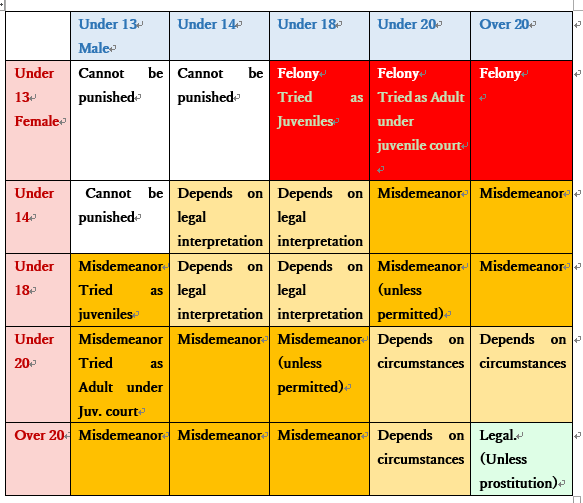i was on Google Trends the other day seeing what was going on in the world and stumbled upon something weird happening in Japan. “The age of consent” was trending.
Many red flags went up in my head.
I wanted to find out why, but the answers weren’t easy to digest. The first article I read was a 2020 petition calling for Japan to raise the age of consent. More than 50,000 people signed it calling for Japan’s legal age of consent to be raised from 13 to 16.
It reads:
‘The age of consent in Japan is 13 years old. The age of consent refers to the minimum age at which a person is considered to be capable of giving consent to sexual acts.’
‘Do you think a 13 year old teenager is capable of knowing the consequences of sexual activities and saying yes or no?’
The petition continues: ‘Japan has been getting warnings to raise the age from international society as it is very low compared to other countries, however, the age that was enacted over 100 years ago still remains the same.’
‘We demand the Ministry of Justice to raise age of consent. Please help us with the petition to protect teenage adolescence.’
What’s going on and how is this accepted?
In 1907, the Penal Code of Japan set a minimum age of consent of 13. Since then, Japan’s age of consent has not changed. In fact, it’s the third-lowest in the world.
The age of consent in the Philippines used to be 12, but following widespread outcry, a proposal was passed last year to raise the age of consent to 16.
Now, after I received a quick 101 in Japanese law, it’s more obvious that Japan’s age of consent is left intentionally ambiguous. Under the Juvenile Obscene Acts, passed in 1947, no one over the age of 14 can have sex with 13–14 year-olds. The minimum sentence for sex with any female under the age of 13 is five-years.
However, 13 and 14-year olds are permitted to give consent to each other. In short, the age of consent is so confusing in Japan that even this simplified chart begs many questions:

One top writer on Quora, who lived in Japan for several years, theorized that laws are kept deliberately ambiguous enough to allow those in power to get away with the confusing consent laws.
Either way, it’s baffling. Japan may have one of the lowest crime rates in the world, but some even attribute that to their cultural censorship of wide-spread sex crimes.
Japan’s sexualization of young girls
There is a common fetishization of young girls in Japan. JK (joshi kosei or “school girl”) services, which are like maid or hostess cafes but feature minors, are abundant and feed into this fantasy. While many of these JK businesses are non-sexual — others are.
Japan was also one of the last countries to officially ban the possession of child porn. And anyone who’s watched anime is familiar with “kawaii” or cute, another hypersexual fetishization of young girls.
“High school girls are really into this ‘kawaii’ culture so they had to be cute,” said Japanese activist Yayoi Matsunaga in an article titled ‘Sexual assault in Japan: ‘Every girl was a victim.’
50% of young Japanese women have been molested on a train, many being underage. And that’s only what’s been reported. One writer in an article titled Japan’s “Not-So-Secret Shame” reports that over 95% of incidents of sexual violence are not reported in Japan.
These sexual crimes go unreported for good, yet dogmatic reason. Discussing rape is perceived as “embarrassing” in Japan and public opinion often sways towards blaming the victim rather than the attacker.
What’s next?
As British author Douglas Murray recently pointed out in an interview with Jordan Peterson, every country has a dark secret they hide outside in their shed. The more you distance yourself from this shed, the better your country stands. And the closer you are to opening it, the higher the probability for evil and chaos.
America’s dark secret is out. We vehemently hate who we consider “the other,” whether you’re on the side of right or left politics. Japan’s dark secret, however, is being buried. As foreigners, we perceive that everything is great there. Their economy, culture, and food cannot be beaten.
Unfortunately, it enables this sinister issue of the sexualization of young girls to fall by the wayside.
While I’ve always been drawn to the country’s culture, food, and video games, I’ve always heard of this dark secret that seems tucked away in the shed.
While researching for this article, many of the stories I came upon gave me the impression that the cat was out of the bag; and that real change was going to happen in Japan now.
It didn’t. Things are still the same. Arguably worse as statutory rape cases have increased in recent years.
I think with the Japanese Olympics on the horizon it’s time to highlight this issue. This is something that a viral petition and a few excellent writers couldn’t blow the lid off of, but a momentous push in time for the Olympics could. Reform needs to happen. Many young women need help.
Increased awareness and informing yourself about the issue is the first step. Supporting groups like Feminism in Japan — the group behind the petition — and Groping Prevention Activities Centre is the next.
Comments
Post a Comment